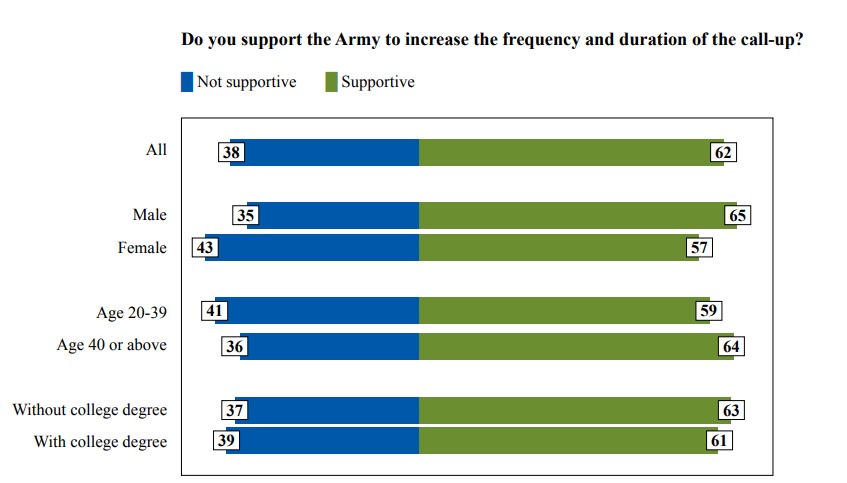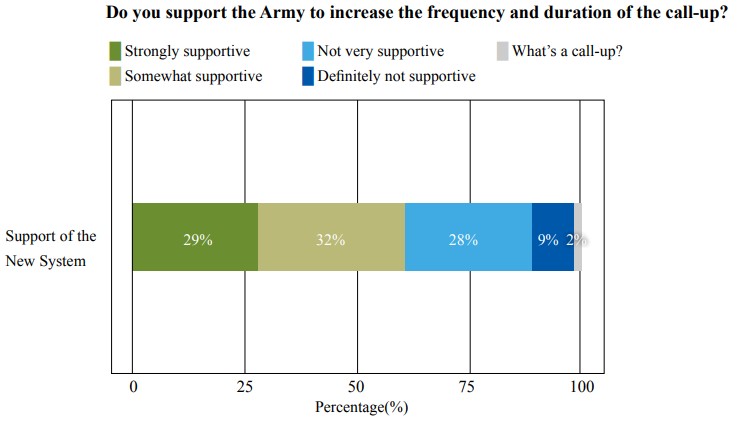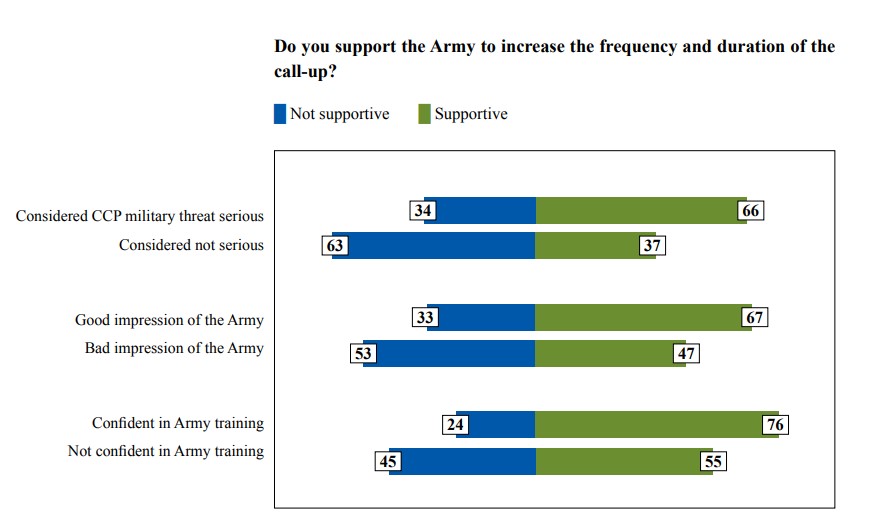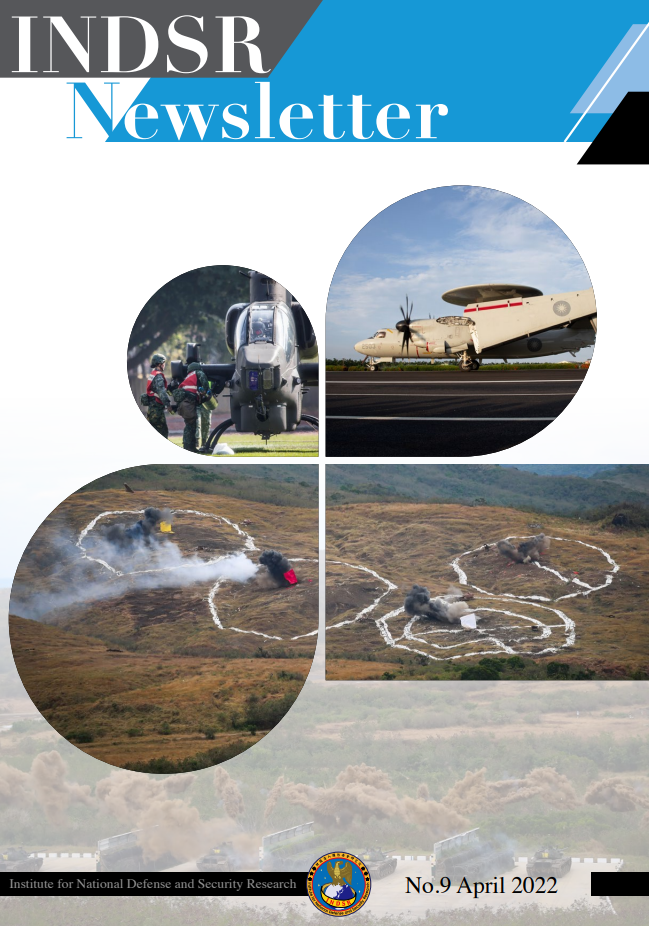1. News Highlights
Taiwan implemented a 14-day “New Training Call-up System” (“New System”) for the military for the first time on March 5, 2022. Compared to the older system, the New System not only increases the training frequency and duration, but also significantly raises training intensity. In addition to requiring the reservists to report directly to their tactical positions to familiarize themselves with the battlefield environment, the course also includes tactical marching, camping, more live-fire shots, and more combat maneuver training hours, making it the “toughest call-up ever”.[1] Although the Ministry of Defense adjusted the compensation and allowances of enterprises and personnel in line with the New System, the call-up is, after all, a recall of discharged soldiers to the military. The impact on their daily work and life is still inevitable.[2] In view of this, this article attempts to understand the people’s views on the New System through polling and analyzing the key factors that influence their opinion of the New System to explore possible ways to promote public support for the New System.[3]
2. Security Implications
2-1. Over 60% of respondents support New System
To measure the public’s support for the New System, the poll asked respondents, “Do you support the military to increase the frequency and duration of the call-up?” The findings: 28.6% of respondents said they are strongly supportive of the new system; 32.3% said they are somewhat supportive; 28.4% said they are not very supportive; 9.2% said they are definitely not supportive; and 1.5% did not know what a call-up was (see Figure 1). Overall, more than 60% of the respondents supported the military’s promotion of the New System. Please refer to the Appendix for more details on the distribution and cross-tabulation analysis.
Figure 1: Distribution of people’s support for the New System Do you support the Army to increase the frequency and duration of the call-up?
Note: Decimal points are rounded to the nearest whole number.
Source: Compiled by Lee Kuan-chen from “Online Survey on Taiwanese People’s Views on National Defense Policy”.
2-2. 2. Age doesn’t matter in supporting New System
The target of the call-up is determined based on when full discharge is set according to the rank of the reservists. In the case of voluntary, professional service men and women, the age of discharge is 45; but generally, most candidates for the call-up are younger people who recently left the military, so it is understandable that this group may be the most opposed to the New System. However, the survey found that although respondents from different backgrounds had different attitudes towards the New System, the overall difference was minimal (see Figure 2). For example, 65% of the male respondents supported the New System, while the percentage of female supporters dropped to 57%. Of the respondents aged between 20 and 39, 59% supported the New System, only 5% lower than those aged 40 or above. The difference in support for the New System between respondents with or without a college degree was even smaller, only about 2%. The results show that the demographic difference of the respondents are not the main factor affecting their support of the New System.

Figure 2: Respondents of different genders, ages and education levels support the New System Do you support the Army to increase the frequency and duration of the call-up?
Note:
1. Decimal points are rounded to the nearest whole number.
2. “Support” includes “Strongly supportive” and “somewhat supportive”, and “unsupportive” includes “not very supportive” and “definitely not supportive”. The answer to “what’s a call-up?” was categorized as “no response” and excluded from the analysis.
Source: Compiled by Lee Kuan-chen from “Online Survey on Taiwanese People’s Views on National Defense Policy”.
2-3. “Threat awareness”, “impression of military” and “confidence in training” are key factors
The survey further revealed that respondents’ threat awareness, the impression of the military, and confidence in the call-up training were the key factors affecting their support for the New System. For example, Figure 3 shows that 66% of respondents who perceived the CCP’s military threat to Taiwan to be serious supported increasing the frequency and duration of call-ups by the military, while only 37% of respondents who did not consider the threat serious supported it. This means that the public’s awareness of threats from China is the first factor in galvanizing the will to resist and strengthen the defense readiness. Moreover, in the cross-tabulation analysis of the impression of the military and support for the New System, the poll results showed that among those who had a better impression of the military, a higher percentage, about 67%, of respondents supported the New System; on the other hand, those who had a poor impression of the military showed less support at 47%. Finally, respondents’ confidence in the training also significantly affected their support for the New System. 76% of those who were confident in the training supported the New System, but only 55% of those who were less confident showed their support. This means that besides the threat awareness, people’s impression of the armed forces and the effectiveness of the training were also key factors affecting the support for the New System.
Figure 3: how “threat awareness”, “impression of the military”, “confidence in training” affect support for the New System
Do you support the Army to increase the frequency and duration of the call-up?
Note:
3. Decimal points are rounded to the nearest whole number.
4. “Support” includes “Strongly supportive” and “somewhat supportive”, and “unsupportive” includes “not very supportive” and “definitely not supportive”. The answer to “what’s a call-up?” was categorized as “no response” and excluded from the analysis.
Source: Compiled by Lee Kuan-chen from “Online Survey on Taiwanese People’s Views on National Defense Policy”.
3. Trend Observation
3-1. I. Russia’s invasion of Ukraine boosts public support for New System
The New System call-up coincided with the outbreak of the Russo-Ukrainian conflict. Although Ukraine and Taiwan are geographically apart in Europe and the Western Pacific respectively, they are similar in terms of their geostrategic and domestic political situations; that’s why Russia’s invasion of Ukraine is often associated to whether China will invade Taiwan.[4] Although the situation in Ukraine may not be directly analogous to that of Taiwan, the conflict in Ukraine has sparked much discussion in Taiwan about the possibility of a Chinese invasion and the level of Taiwan’s military readiness. Since the poll found that threat awareness is a factor influencing Taiwanese people’s support for the New System, it cannot be ruled out that since the war between Russia and Ukraine, there has been an increase of people’s support for Taiwan’s new reservist training program.
3-2. Better image and training of miliary to strengthen support for call-up
One of the most criticized problems of the military is its perceived superficiality. For the general public, the perception of the call-up was often just a “show” not much more than gathering the reservists and finishing the days safely.[5] After decades, the call-up has been seen as a just a waste of time. This kind of optic of “superficial readiness” certainly cannot win people’s support. If the call-up training can familiarize the reservists with the battlefield environment, weapons, and survival skills, they will know how to protect themselves and survive when a war unfortunately breaks out. Even if they are not going to the frontline, the call-up will be more meaningful to the public. Since people showed their support for the New System in the poll when they have a better impression of the military and more confidence in the training, it is necessary to improve the image and training of the armed forces in the long run to further increase public support for the call-ups.
Appendix Table: Distribution and cross-tabulation of attitudes in support of the New System
|
Do you support the Army to increase the frequency and duration of the call-up?
|
|
Strongly supportive
|
Somewhat supportive
|
Not Supportive
|
Definitely not supportive
|
“What’s a call-up?”
|
Samples
|
|
28.6%
|
32.3%
|
28.4%
|
9.2%
|
1.5%
|
1498
|
|
|
Do you support the Army to increase the frequency and duration of the call-up?
|
|
|
Supportive
|
Not supportive
|
Samples
|
|
Gender:
|
|
|
|
|
Male
|
65%
|
35%
|
878
|
|
Female
|
57.1%
|
42.9%
|
597
|
|
Age:
|
|
|
|
|
20-39
|
58.8%
|
41.2%
|
529
|
|
40 or above
|
63.5%
|
36.5%
|
946
|
|
Education:
|
|
|
|
|
With
|
62.9%
|
37.1%
|
367
|
|
University and above
|
61.5%
|
38.5%
|
1108
|
|
PLA military threat:
|
|
|
|
|
Serious
|
65.9%
|
34.1%
|
1266
|
|
Not Serious
|
37.3%
|
62.7%
|
209
|
|
Impression of ROC Armed Forces:
|
|
|
|
|
Good
|
67.3%
|
32.7%
|
1073
|
|
Bad
|
47.3%
|
52.7%
|
402
|
|
ROC Armed Forces training:
|
|
|
|
|
Confident
|
75.6%
|
24.4%
|
495
|
|
Not Confident
|
54.9%
|
45.1%
|
980
|
(Originally published in the 50th “National Defense and Security Biweekly”, March 25, 2022, by the Institute for National Defense and Security Research.)
(The contents and advice in the assessments are the personal opinions of the authors, and do not represent the position of the Institute for National Defense and Security Research)
[1] For related reports, see “The First Batch of the 14-day New System Call-up Entered the Camp on 5th. 10-hour Training Day for Two Weeks Non-stop,”CNA News, March 2, 2022, https://www.cna.com.tw/news/aipl/202203020091.aspx. Lin Yirong, “The Toughest Military Call-up in History! Started on 5th and Lasted for 14 Days without Leave. See what’s in Their Training and Must-have Items,” UDN Online, March 4, 2022, https://udn.com/news/story/6839/6139581.
[2] Hou Li'an, “In the 14-day New System Call-up, Awards Given to Volunteers and Reservists Answering the Call-up for the Fifth Time,”UDN Online, January 20, 2022, https://udn.com/news/story/10930/6047020. “Pregnant Women with 1-year-old Child Sent Husband to the Call-up. Husband: Just Doing My Job,” UDN Online, March 6, 2022. https://udn.com/news/story/10930/6144146.
[3] The data used in this article are taken from the “Online Survey on Taiwanese People’s Views on National Defense Policy”. The survey was conducted by the Center for Election Studies of National Chengchi University, commissioned by the Institute for National Defense and Security Research, from November 15 to 30, 2021, on Taiwanese adults aged 20 and above. With a total of 1,520 successful samples, excluding those with short response time (less than 3 minutes) and illegitimate answers for validation questions, the actual number of cases analyzed was 1,498. Although the interviewees came from the database of respondents in the past phone interviews collected by the Center for Election Studies of National Chengchi University, since the samples are conceptually “similar probability samples”, the overall bias is smaller than that of all voluntary samples. See Chen-Hua Yu, “Theory and Practice of Online Public Opinion Surveys,”New Theory of Public Opinion Surveys, edited by Lu-Hui Chen(Wunan Publishing, Taipei, 2013), pp. 31-64. However, whether or not to participate in online surveys is still voluntary, so there is still a gap between the characteristics of the sample and the population.
[4] Professor Wu Yushan, a member of Academia Sinica, believes that there are similarities between Ukraine and Taiwan. See Wu Yushan, “How Far are we From War? The Strategy of Small States between Superpowers,”Researchyowu, August 5, 2020. https://research.sinica.edu.tw/global-strategies-pivot-hedger-partner. Yang Cheng-yu, “Both are Most Dangerous: Experts Say Taiwan and Ukraine are Surprisingly Similar,”The Liberty Times, January 14, 2022, https://udn.com/news/story/10930/6047020.
[5] Liu Yiyou pointed out that in the past, there were problems such as “afraid of accidents, afraid of being sued, easy training, and pass everything by” in the Army's annual call-ups, see Liu Yiyou, “Changes in the Military Training of the Chinese PLA’s ‘Reserve Forces’ and Discussion of the Taiwanese Army Reserve’s Policies in Response to the Recruitment System,”National Defense Magazine, Vol. 25, No. 1, February 2010, p. 120. For a related report, see “Double Pay for Call-ups is Great? Man Says, ‘Just Killing Time’. A Reservist: ‘the System is Doomed’,”NOWnews, February 4, 2021, https://www.nownews.com/news/5181980.





